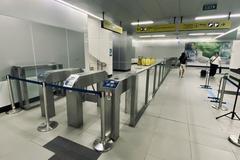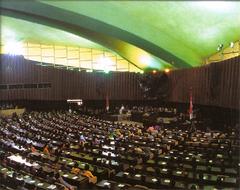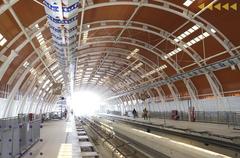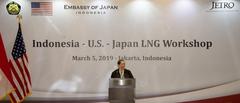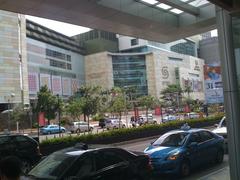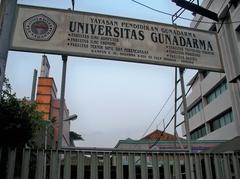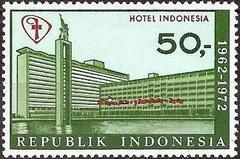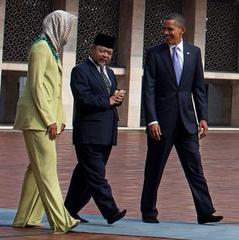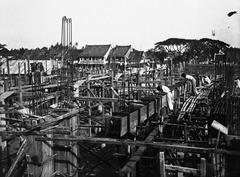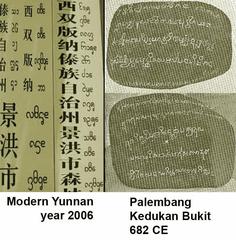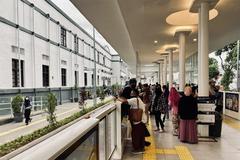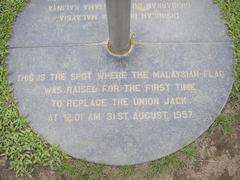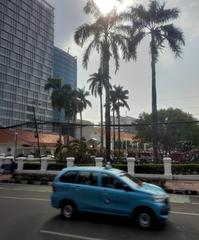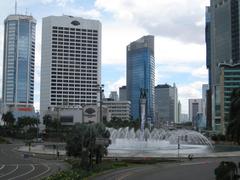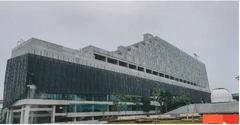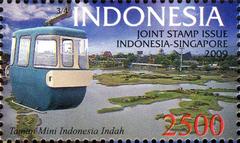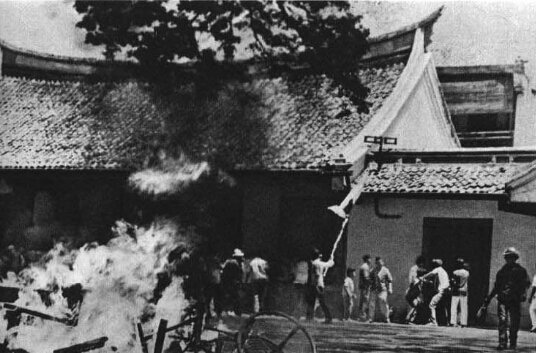
Embassy of the People’s Republic of China in Jakarta: Visiting Guide, Tickets, Hours, and Tips
Date: 14/06/2025
Introduction
The Embassy of the People’s Republic of China in Jakarta is a cornerstone of diplomatic engagement, economic partnership, and cultural exchange between China and Indonesia. Established in 1950 and revitalized after the restoration of formal diplomatic ties in 1990, the embassy has evolved to reflect the dynamic interests of both nations. Beyond providing consular services such as visa processing and emergency support, the embassy plays a pivotal role in advancing China’s Belt and Road Initiative, facilitating high-level governmental cooperation, and fostering cultural understanding through public diplomacy.
Strategically located in South Jakarta’s diplomatic district, the embassy’s architecture elegantly blends modernity with traditional Chinese elements, symbolizing a bridge between heritage and progress. Visitors—whether seeking travel documentation, consular assistance, or cultural programs—will find a secure, accessible, and well-organized environment. The embassy also acts as a guardian for Chinese nationals in Indonesia, exemplified by its recent intervention against tourist extortion at Soekarno-Hatta International Airport (Straits Times).
This comprehensive guide details everything prospective visitors need to know: location, visiting hours, visa procedures, accessibility, nearby attractions, and the broader significance of the embassy in China-Indonesia relations. For the latest updates, always consult official embassy channels and reputable news sources such as The Diplomat.
Table of Contents
- Historical Overview
- Embassy Functions and Bilateral Engagement
- Addressing Challenges and Public Perception
- Architectural and Cultural Highlights
- Visitor Information and Consular Services
- Embassy’s Regional Role and Recent Milestones
- Frequently Asked Questions (FAQ)
- Conclusion
- Sources
Historical Overview
Early Diplomatic Relations
Formal diplomatic relations between the People’s Republic of China and Indonesia began in 1950, soon after both nations gained sovereignty. The initial decades saw close cooperation, but shifting geopolitical dynamics—most notably, the 1965 anti-communist purge in Indonesia—led to the suspension of ties in 1967. For over twenty years, the embassy was closed, reflecting a period of diplomatic freeze.
Suspension and Re-establishment
Diplomatic relations were restored in 1990, coinciding with China’s “reform and opening up” and Indonesia’s economic liberalization. The reopening of the Chinese Embassy in Jakarta marked a new chapter, expanding its mandate to include economic, cultural, and people-to-people engagement. Since then, the embassy’s presence and influence have grown, mirroring the deepening partnership between Beijing and Jakarta.
Embassy Functions and Bilateral Engagement
The Chinese Embassy in Jakarta is instrumental in facilitating high-level governmental exchanges, economic cooperation, and cultural diplomacy. It actively supports China’s Belt and Road Initiative in Indonesia through infrastructure projects and investment, and collaborates with Indonesian think tanks and academic institutions to promote positive engagement and mutual understanding (The Diplomat).
Public diplomacy is a key focus, with embassy-sponsored research, youth programs, and cultural events strengthening ties and enhancing China’s image in Indonesia. The embassy also provides consular protection for Chinese nationals, working closely with local authorities to address issues ranging from legal disputes to safety concerns.
Addressing Challenges and Public Perception
Despite robust engagement, challenges persist, including sensitive geopolitical issues such as the South China Sea disputes and concerns over Chinese investments. The embassy proactively addresses these through public outreach and bilateral dialogue.
In 2025, the embassy played a critical role in addressing extortion incidents targeting Chinese tourists at Soekarno-Hatta International Airport, resulting in the dismissal of implicated immigration officers and the introduction of anti-extortion measures (Straits Times; VnExpress). This underscores the embassy’s evolving function as both a diplomatic mission and a protector of its citizens abroad.
Architectural and Cultural Highlights
The embassy compound in South Jakarta is characterized by modern architecture interwoven with traditional Chinese motifs, reflecting both innovation and heritage. Regular cultural events, exhibitions, and celebrations of Chinese festivals are organized, fostering community ties and cross-cultural appreciation.
These initiatives are part of the embassy’s broader strategy to promote goodwill and mutual understanding, often in partnership with local Indonesian organizations.
Visitor Information and Consular Services
Location and Contacts
- Address: Jl. Mega Kuningan Timur No. 4, South Jakarta, Indonesia
- Phone: +62 21 5795 5000
- Official Website: Embassy of China in Indonesia
Visiting Hours
The embassy is open for consular services from Monday to Friday, 9:00 AM–12:00 PM and 1:30 PM–4:00 PM (excluding public holidays). Always check the embassy’s website or call ahead for updated hours and appointment requirements.
Visa Application Process
The embassy handles visa applications for Indonesian citizens and residents traveling to China. Key points:
- Visa Types: Tourist, business, student, and more
- Requirements: Completed application, valid passport, passport photo, supporting documents
- Biometric Data: Fingerprinting is required for most applicants (Visa for China Jakarta)
- Processing Time: Generally 4–5 business days; expedited services may be available
Applications are accepted in person or via authorized agencies. Refer to the embassy website for current guidelines.
Additional Services
The embassy also provides:
- Notarial and legalization services
- Chinese passport renewals
- Emergency support for Chinese citizens
- Consular assistance for Indonesians traveling to China
Accessibility and Travel Tips
- Accessibility: The embassy is wheelchair accessible with ramps and elevators.
- ID and Security: Bring valid identification. Security checks are mandatory; photography is prohibited in the building.
- Getting There: The embassy is accessible by car, taxi, ride-hailing apps, and public transport (TransJakarta, KRL, MRT Jakarta). Parking is limited; use public transport where possible.
- Appointments: Most services require an advance appointment.
Embassy’s Regional Role and Recent Milestones
As China’s largest diplomatic mission in Indonesia, the embassy coordinates closely with the Chinese Mission to ASEAN and regional partners. It supports ASEAN-China forums, maritime security initiatives, and educational exchanges, reinforcing China’s role in Southeast Asia (The Diplomat).
Recent milestones include strategic partnership agreements, Belt and Road infrastructure projects, and medical cooperation during the COVID-19 pandemic.
Frequently Asked Questions (FAQ)
Q1: What are the embassy’s visiting hours?
A1: Monday–Friday, 9:00 AM–12:00 PM and 1:30 PM–4:00 PM, except public holidays.
Q2: How do I apply for a visa?
A2: Submit a completed application, passport, photo, and supporting documents in person or via agencies. Fingerprinting is required.
Q3: Can I take photos inside the embassy?
A3: No, photography is not permitted for security reasons.
Q4: Where is the embassy located?
A4: Jl. Mega Kuningan Timur No. 4, South Jakarta, Indonesia.
Q5: How does the embassy assist Chinese nationals in Indonesia?
A5: It provides consular protection, emergency support, and legal assistance.
Conclusion
The Embassy of the People’s Republic of China in Jakarta is a vital institution for diplomatic engagement, consular support, and cultural exchange. Visitors will find a secure, accessible, and efficient environment, reflective of the embassy’s commitment to both practical service and the advancement of China-Indonesia relations.
Stay informed by consulting the embassy’s official website, trusted news sources, and the Audiala app for real-time updates on consular services, travel advisories, and cultural events. Planning ahead ensures a smooth and productive visit, whether for documentation, assistance, or cultural enrichment.
Sources
- China’s think-tank diplomacy is gaining traction in Indonesia, 2022, The Diplomat
- Indonesia takes steps to avert extortion of tourists at its main gateway, 2025, Straits Times
- 30 immigration officials at Indonesian airport dismissed for alleged extortion of Chinese tourists, 2025, VnExpress
- Visa for China Jakarta Biometric Fingerprinting Notice, 2025, Chinese Embassy Jakarta
- EmbassyPages: China Embassy Jakarta Indonesia
- The Broke Backpacker: Jakarta Itinerary






